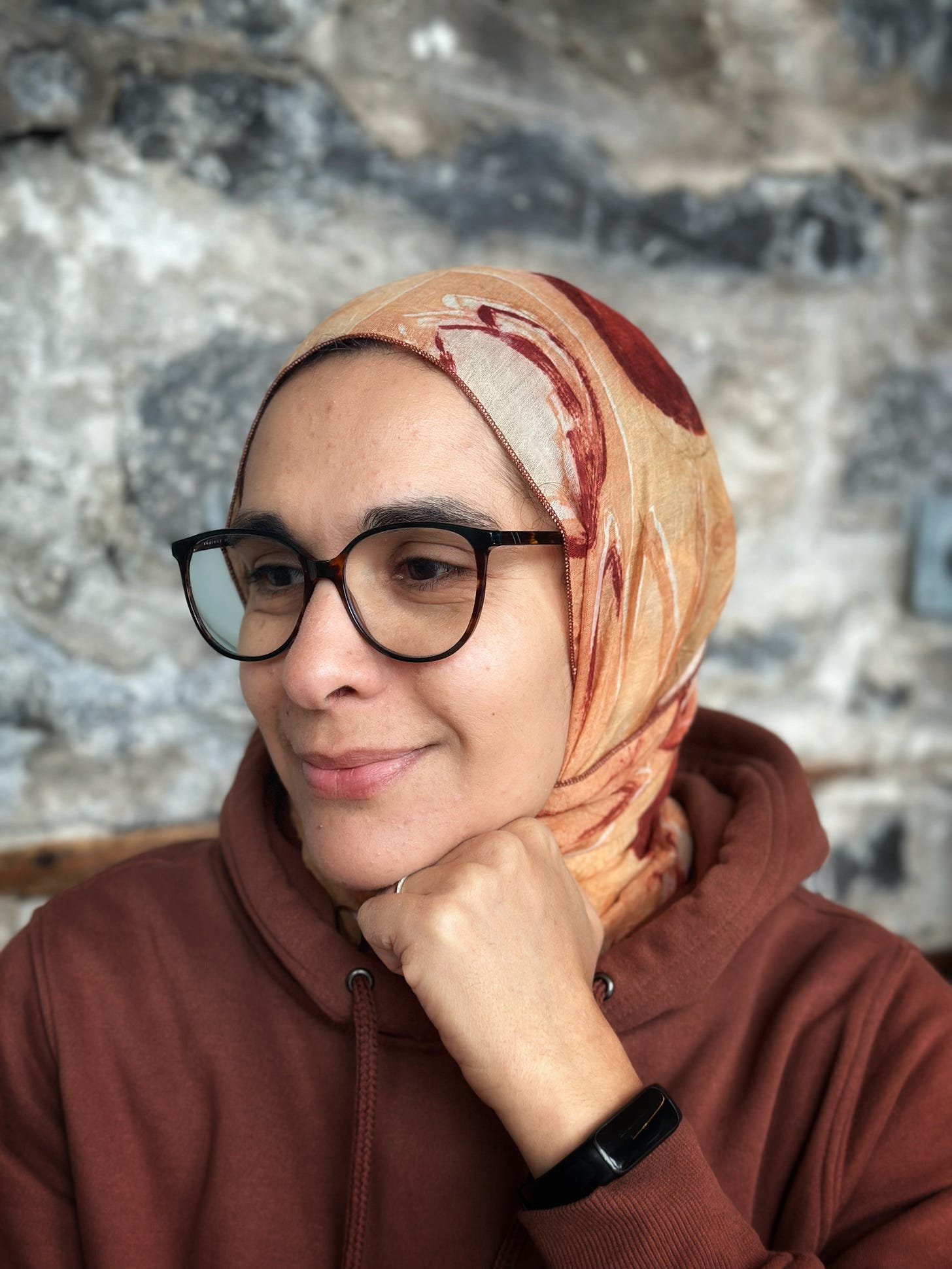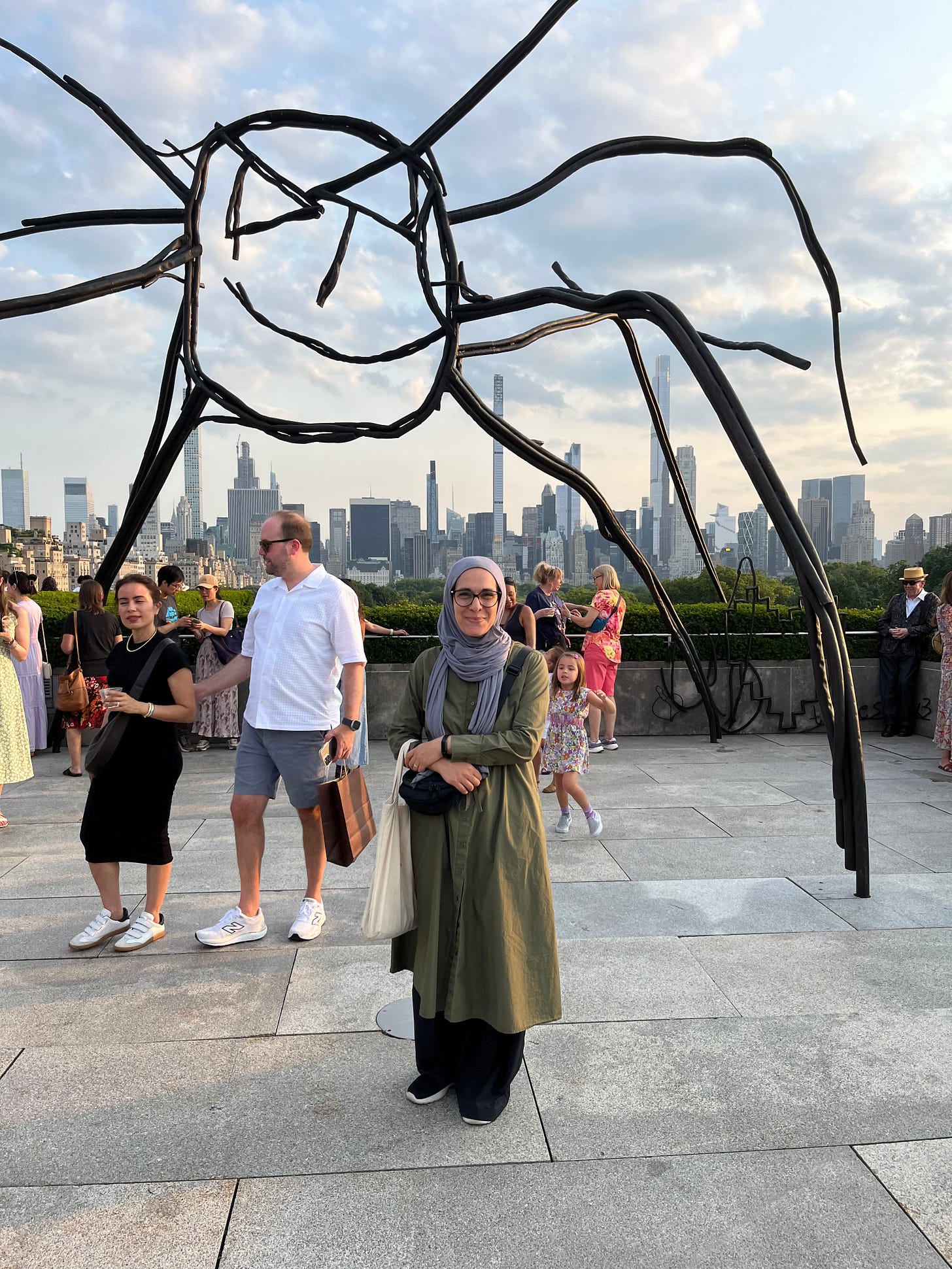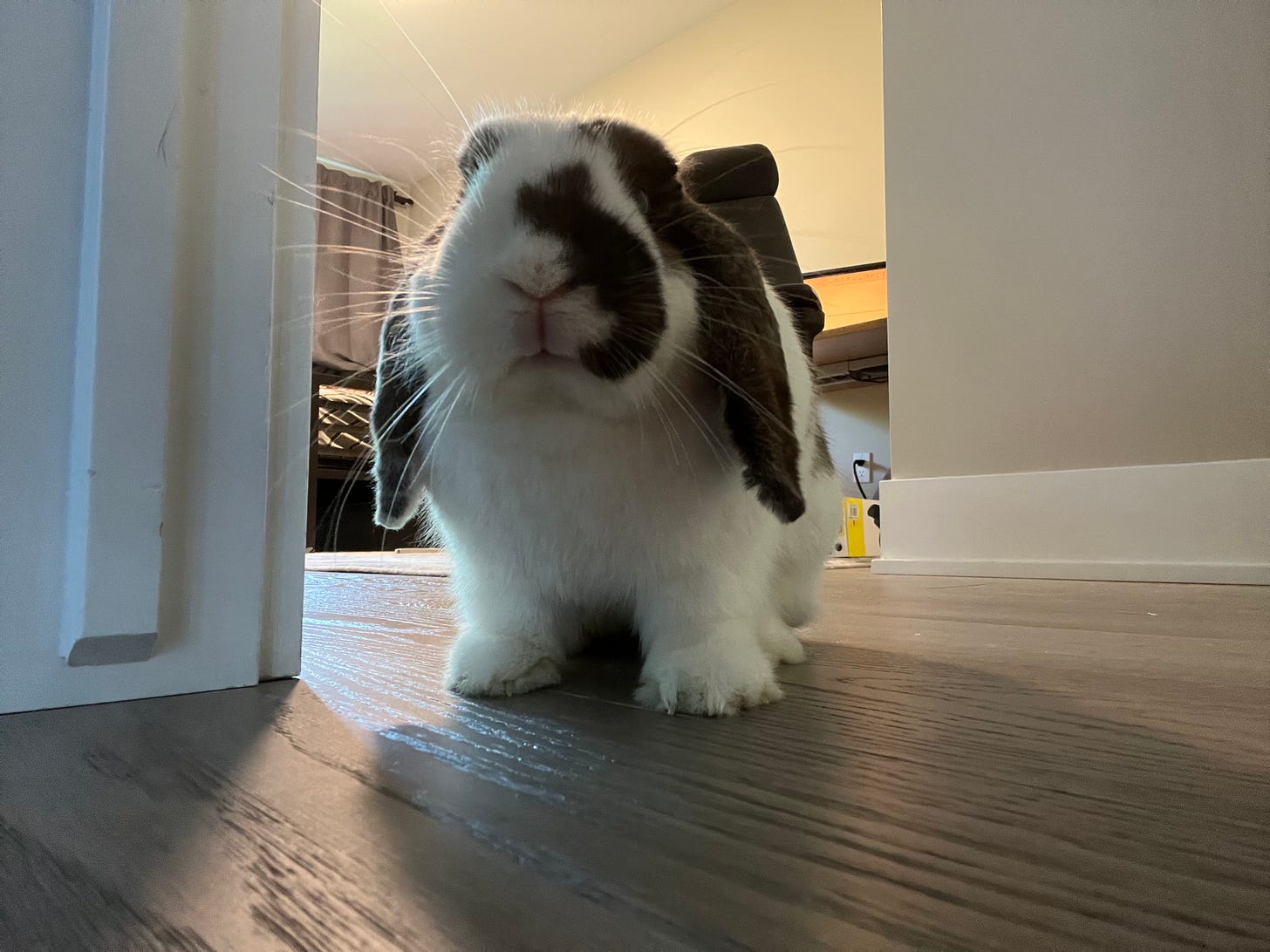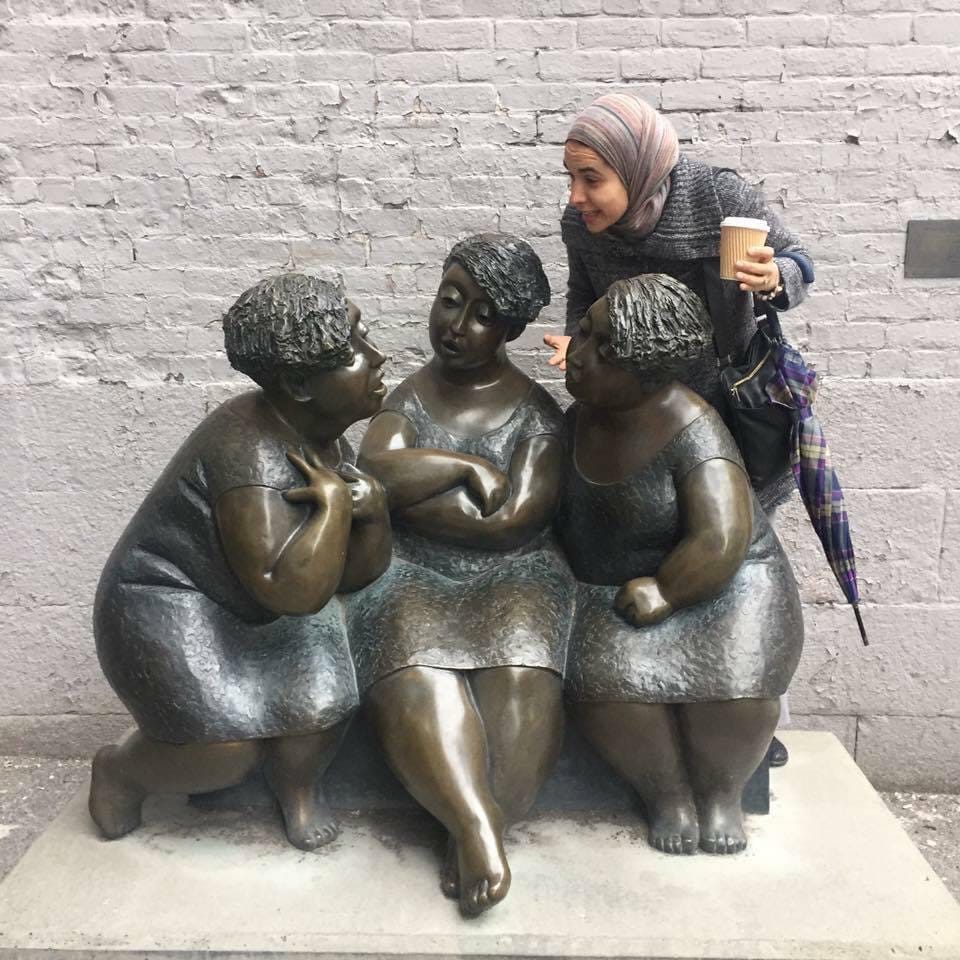A Place Of Love And Hope
The Body, Brain, and Books: Eleven Questions with writer Noha Beshir
Welcome to another edition of The Body, Brain, & Books. If you enjoy reading these quick, insightful interviews brimming with wisdom and hope, please subscribe to Beyond!
is a Muslim Canadian writer, cycling enthusiast, and grown-up third-culture kid. Her words can be found at Maisonneuve Magazine and on Substack at Letters from a Muslim Woman, where she shares her honest experiences of life as a Western Muslim by writing about mental-health, motherhood, and the multi-generational immigrant experience. She lives in Ottawa, Canada with her husband, their two boys, and their bunny, Bilbo.What are you reading now?
I was struggling to read books for a long stretch, but I read Half of a Yellow Sun by Chimamanda Ngozi Adichie on a family road trip this summer and it seems to have opened the floodgates to book reading again. I’m suddenly ravenous; Give me all the books!
So now I’m reading a few different books simultaneously:
A day in the life of Abed Salama: Anatomy of a Jerusalem Tragedy by Jewish American author and essayist Nathan Thrall. It’s a Pulitzer prize winner that tells the true story of Abed Salama’s search for his five year old son after a terrible bus accident in 2012. The author must have done years of research around the Israeli-Palestinian conflict, and the occupation of the West Bank. I love that there is no attempt to paint Abed Salama as some sort of perfect victim. He’s a human who has done human things and had human responses to the suffering in his life. It’s a slow read because every page packs a punch and needs digesting.
Sorry I’m Late, I didn’t want to come by
. I actually only discovered her through her hilarious newsletter, which is like a warm blanket for me. When I’m reading it, I feel like I’m in Meg Ryan’s bookstore in You’ve Got Mail. Anyway, the book is so funny I keep laughing out loud and my 13 year old son keeps saying, “what?” and then I keep reading him whole paragraphs out loud. For an outgoing person like me, this is a great perspective shifter in how the other half lives.Before and After the Book Deal by
, to try to understand more about the book writing and publishing process.How does it feel to be a problem? Being Young and Arab in America by Moustafa Bayoumi. I wish I’d read this one years ago. Instead of spending my twenties in my head asking the same questions, I could have had the comfort of documentation that there were so many of us who were struggling with similar experiences.
And Elamin Abdelmahmoud’s Son of Elsewhere, but I’ll tell you about that one a little later.
What are your most beloved books from your youth? Did you ever hide any from your parents?
I read constantly as a child, but most of the books were easily read and easily forgotten - a lot of The Babysitters Club, Christopher Pike, and so on. In elementary school, anything by Gordon Korman was a go-to. I loved how his books captured the absurdity of the teenage years, where you’re full of all this energy but have little-to-no control. A couple of my favourites were Son of Interflux and Don’t Care High. My kids are big Gordon Korman fans. It turns out he remained a prolific author and has continued to publish at breakneck speed. They’ve read all the books I read and maybe 30 others he published after I’d grown up.
There was also this random Canadian trilogy by Martyn Godrey, called, Here she is: Miss Teeny Wonderful, about a tomboy whose mother signs her up for a beauty pageant, and the hijinks that ensue. I reread it at least 5 times! I’ve never been a contestant in a beauty pageant, but the inherent otherness of the protagonist was something that really resonated for me. It’s out of print now and was never very famous, so it would be fun to find someone else who’s read it.
My mom did check what we brought back from the library and she wouldn’t allow anything explicit or where the language was intense, but she didn’t ban books with difficult content. And I was way too much of a goodie-two-shoes to dream of hiding books!
My literary tastes as a kid weren’t particularly highbrow. When I got to high school and studied in a creative writing program, my teachers introduced me to CanLit, and to literary fiction in general. I remember reading a lot of Jane Urquhart, Michael Ondaatje, and E. Annie Proulx. I loved The Shipping News and Fall On Your Knees.
What’s your favorite book to reread? Any that helped you through a dark time?
I’m not big on rereading whole books. I will reread essays though, and two of my favourites are Ta-nehisi Coates’ “The case for reparations,” and Elamin Abdelmahmoud’s “I wanted my last name to be a burden”.
I reread Pride and Prejudice from time to time just for the joy of it. Mr. Collins and Lady Catherine de Bourgh make my life with their ridiculousness!
I am currently re-reading the memoir, Son of Elsewhere by Elamin Abdelmahmoud. When it was first released a couple of years ago, I read it in one weekend – basically just stopped my life and sat there inhaling it on our sofa. It was a huge lightbulb moment for me, in terms of seeing a life that somewhat mirrored my own represented on paper.
I remember turning to my husband afterwards and saying, “maybe my story as a child of immigrants from an Arab-Muslim background is worth telling afterall.” Without that book, I don’t think I would have ever started writing memoir or personal essays, because I wouldn’t have recognized that there was anything inherently interesting about my experience. Two years ago I read it as a reader. Now I’m going through it with a writer’s lens and taking notes.
The only book I consistently re-read is the Quran, which is the Muslim holy book. We’re encouraged to read it the whole way through at least once a month, but I only ever pull that off during Ramadan, our month of fasting (and even that is hit and miss.) The rest of the year, I read a few pages a day when I can.
I read it in the original Arabic for the poetry and lyricism, although I have English translations that I refer to for meaning and clarity. When I’m going through a hard time, I seem to always come across a verse that gives me comfort, or that I’ll understand in the new light of my momentary circumstances. I explored this in an essay last winter on my newsletter.
What’s an article of clothing that makes you feel most like you?
I’ve attempted stylishness on and off for years, but I default to practical and comfortable clothes in the end. My husband and I often look mismatched when we’re out in the world, because he’s smartly dressed and I’m schlepping around in a denim shirt dress and cargo pants with as many pockets as possible.
Case in point, this past summer we were visiting NYC and we went into a couple of high-end stores for fun. The kids and I sat on a bench while my husband went to look for something. Nobody paid us any mind, but then as soon as hubby reappeared, the nearest sales lady took an interest in us. All, “Sir, can I help you find something?” My theory is that it was his clothes. She thought she could make a sale!
The clothes that make me feel most like myself are the ones I’ve had forever, not the trendiest or newest things. I inherited a thick knitted sweater from my dad that I swear he’s had since I was a small child in the 80’s. It’s heavy without being scratchy, perfect for winter, and by some miracle, it’s fashionable again so I can wear it to the office!
What’s the best piece of wisdom you've encountered recently?
Whether you think you can or you think you can’t, you’re right. I used to laugh at a lot of the mindset stuff, and it can be very woo woo, but I’ve found certain aspects helpful.
Your thoughts dictate your behavior: I didn’t write for years because I thought I couldn’t do it while working full time, looking after two kids, and being part of my extended family and community. Dismissing it as impossible made it impossible.
I’m about a year and a half into regularly writing again, and just deciding to do it has led to some amazing things. I’ve made so many friendships since I re-prioritized my creativity. I’ve found my voice. I’ve realized that there’s a way to write that doesn’t mean quitting my job and moving my family to Iowa to get an MFA (which was never going to happen).
Tell me about any special relationship you’ve had with an animal, domestic or wild?
Our rabbit, Bilbo, delights me constantly. She’s a Holland Lop, almost 2 years old. We spend a lot of time together on the days I work from home, where she’ll just chill at my feet under my desk. Holding her or petting her really helps me come down if I’m feeling too wired, which is often.
My sisters and I had pet rabbits as children, but I realize now that I saw them as playthings, rather than creatures with their own fears and hopes (even if those hopes are just about eating as many apple slices as possible). With Bilbo, I observe her behaviour and if she’s stressed or nervous, it breaks my heart. Animals are special because they cut to the core of living. It’s not nuanced or complicated - just raw instinct, wants, and needs.
There’s also my brother-in-law’s dog, Jean-Luc, named for Jean-Luc Picard of Star Trek. I was attacked by a dog at the age of 7 and luckily escaped without injury, but it was one of the most terrifying experiences of my life. Jean-Luc’s presence in my life has helped me overcome my general fear of dogs. He’s a goldendoodle and he’s just the sweetest, most playful creature I know.
What's one thing you are happy worked out differently than you expected?
My husband was working on his PhD in Montreal when we got married. I ended up moving there for a few years while he finished it, before we eventually moved back to my hometown of Ottawa. I’m such a creature of familiarity that I never would have made that move without a reason. Ottawa to Montreal may not seem like much of a change, but it was another world. Montreal is French, cosmopolitan, and has a very European feel. Getting to live there in my late 20’s was a blast. The food! The culture! The joie de vivre!
But it also taught me how it feels to be an outsider. I was primarily an English speaker in a non-English environment, and a visible Muslim in a province where the government actively stokes anti-Muslim sentiment for political reasons. Until then, I’d never seriously considered what my parents had gone through as new immigrants to Canada in the 1970’s. In fact, I had actively tried not to consider it, so preoccupied was I with fitting in and being as “Canadian” as possible, whatever that means. My time in Montreal changed that.
Singing in the shower or dancing in the kitchen? Or another favorite way your body expresses itself?
Kayaking out to the middle of a lake and belting out sad songs from the 90’s. My sisters and I used to do this in the summers, growing up. Now, I do it alone if they’re not in town visiting and I usually start to cry, although I’m never sure if it's because the songs are sad or because I miss my sisters.
Cycling as well, which is something I used to do with dad and sisters as a kid, and now do a lot with my husband and kids. It shows up frequently in my writing.
What are your hopes for yourself?
I want to maintain a writing practice for as long as I live, and for that writing to be a bridge to people who are ready to see past the dehumanization and scapegoating my communities (Arab and Muslim) have endured. To that end, I’m hoping to write a memoir about my life as a child of immigrants growing up in the Islamophobia era.
I want to be known, and by that, I don’t mean famous or well-known, but rather, that my rituals and traditions are not othered or treated as alien.
Both my born-family and my made-family is close knit, and I hope to always have that. It’s such a blessing.
What’s a kindness that changed your life?
I was struggling inwardly with my faith, feeling like a bad Muslim who was only going through the motions. Our faith tradition is big on discipline, intention, and accountability. We have a strong focus on holding yourself to account. Not just doing the good thing, but doing it for the right reasons. I would read these teachings about intention and connection, and go through this cycle of shame (“why don’t I feel connected through my worship?”), followed by determination (“I will simply will myself to change my feelings!”), followed by despair (“I tried and I can’t do it”), followed by numbness, which would lead to shame again.
I shared this with my aunt, and she must have heard the self blame in my voice, because she told me, “you’re feeling like this because you’re approaching God from a place of fear rather than a place of love and hope.”
First I got defensive. “I am not! I’ve always been aware of God’s mercy!” etc etc, but the more I considered her words, the more I realized that I was doing this, albeit subconsciously.
And because of that fear lens, I couldn’t connect. I’d shielded my heart off to protect myself.
It took a while, but I managed to shift my perspective of God to one of a loving, merciful creator. And now I’m not constantly filled with terror and guilt about being a bad person, and my relationship with God is continually growing closer.
What’s a guiding force in your life?
I often think of that line from the Mary Oliver poem, “mostly, I just want to be kind.” My two guiding forces are kindness and justice.
I don’t have a lot of time for niceties. I find them tedious and I can’t keep the different versions of etiquette depending on culture, country, or socio-economic status straight. But I do think kindness and true care for the person in front of you shines through regardless of niceties. You can tell when a person truly cares, whether they know the right words to use, or whether they tip their hat, or whatever.
Justice is a biggie for me too. As a child, my mother tells me that I would end up in tears if I felt that a situation was unfair, and not just when I was on the bad end of a situation. I’m still deeply concerned about justice, and I tend to focus on the injustice, which can be depressing.
If you enjoyed Noha’s questionnaire, you may also enjoy this one with Caroline Donofrio:
⭐️⭐️Beyond with Jane Ratcliffe is a reader-supported publication with the goal of bringing as much light as possible into this world of ours. If you look forward to reading Beyond, please consider becoming a paid subscriber.⭐️⭐️












Noha!!! This just made my day seeing her (you -if you’re reading this!) here!! So fun to learn more about her (you).
“I often think of that line from the Mary Oliver poem, “mostly, I just want to be kind.” My two guiding forces are kindness and justice.”
This really hit home for me as I feel much the same way. I too would become overly emotional regarding unfairness when I was younger and it still bothers me to no end today.
Thank you, Jane, for giving us the chance to learn more about Noha! 😍😍😍 She’s one of my favorite writers here in Substack land.
Adored this entire thing and am so honored to have gotten a mention from such an amazing woman!!!! Thank you so much!!!! xx